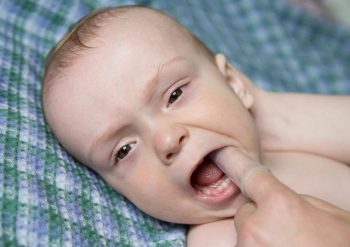If you’ve noticed your baby gnashing their teeth, it can be concerning. While tooth grinding in babies is usually not cause for alarm, there are some things to know about this behavior.
Here, we’ll break down why baby teeth grinding happens, how to tell if it’s something to worry about, and what you can do about it.
Why do babies grind their teeth?
The most common explanation for baby teeth gnashing or clenching is that it is a sign of teething discomfort. When babies are teething, they experience soreness and inflammation in their gums as their teeth come in. For some babies, this can manifest itself as jaw clenching or teeth grinding.
This behavior typically appears around the time when a baby’s first molars come in (around 18-24 months). It is not uncommon for kids up to the age of 5 to grind their teeth occasionally.
When should you be concerned for ?
If your baby is only gnashing their teeth periodically (less than a few times per night), then chances are it isn’t anything serious and will likely resolve itself over time.
But if your baby grinds their teeth regularly—especially during the day or when they are awake—it could be an indication of pain or stress caused by an underlying medical condition such as ear infections or allergies. In these cases, it is best to consult with your doctor for further evaluation and treatment plan.
It is also important to note that prolonged and frequent teeth grinding can cause dental issues such as misaligned or damaged teeth down the line; so if your child does grind their teeth frequently, it may be worth discussing possible solutions with a dentist.
Conclusion:
Bruxism (teeth grinding) in babies is usually temporary, but frequent or prolonged cases may indicate a medical concern requiring a doctor or dentist. Stay informed, know the signs, understand the causes, and follow recommended treatments for a healthy mouth.



